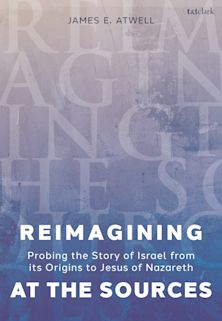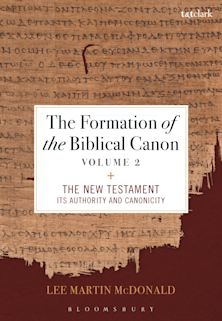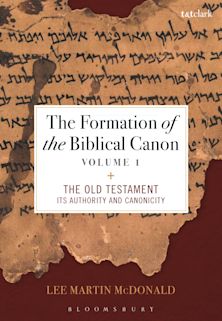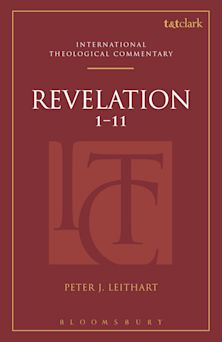- Home
- ACADEMIC
- Biblical Studies
- Biblical Interpretation
- In Tongues of Mortals and Angels
In Tongues of Mortals and Angels
A Deconstructive Theology of God-Talk in Acts and Corinthians
In Tongues of Mortals and Angels
A Deconstructive Theology of God-Talk in Acts and Corinthians
You must sign in to add this item to your wishlist. Please sign in or create an account
Description
Through close textual engagement, theological exposition, ethical reflection, and interdisciplinary collaboration, this book presents a constructive theology of divine speech in the Acts of the Apostles and 1 Corinthians in critical conversation with contemporary issues of sociopolitical, ecclesial, and theological importance. In particular, the authors attend to pericopes in Acts and Paul that open up fresh ways of thinking about divine discourse, preaching, and advocacy in light of contemporary matters of theological and ethical import. In addition to classical modes of textual and theological analysis, the authors attend to the sociopolitical and sociolinguistic aspects of speech as they arise in these pericopes. As such, the authors are simultaneously deconstructing these texts through postcolonial and post-structural analyses to expose these texts to an alterity at work therein, an alterity that has been muted by centuries of biblical interpretation.
Table of Contents
Chapter 2: Bold Speech: Acts 4:1–22 by Jacob D. Myers
Chapter 3: Prophetic Speech: Acts 10:34–48 by Thelathia Nikki Young
Chapter 4: Strange Speech: Acts 17:16–34 by Eric D. Barreto
Chapter 5: Baptismal Speech: Acts 18:24–19:8 by Jacob D. Myers
Chapter 6: Wise Speech: 1 Corinthians 2:1–16 by Jacob D. Myers
Chapter 7: Loving Speech: 1 Corinthians 13:1–13 by Thelathia Nikki Young
Product details
| Published | Nov 15 2018 |
|---|---|
| Format | Ebook (PDF) |
| Edition | 1st |
| Extent | 146 |
| ISBN | 9781978784598 |
| Imprint | Fortress Academic |
| Publisher | Bloomsbury Publishing |
About the contributors
Reviews
-
Amid the glut of words and din of speech in our round-the-clock cyclone of news, talk, and (mis/dis)information, how do we speak authentically with and for God, from the Bible, to our contemporary social and political contexts? This book models a fresh dialogical, intersectional, and interdisciplinary approach to this challenging issue. Accordingly, the identities of the three collaborating authors matter. Now well into their professional careers, they engage in lively, candid conversation, befitting their friendship dating back to overlapping periods of doctoral study at Emory University. Yet they specialize in different areas: Barreto in New Testament studies, Myers in homiletics, and Young in ethics; and they have different ethnic and sexual orientations.... Each contributor also speaks with her/his distinctive academic accent: Barreto in the language of historical and literary biblical criticism, informed by ideological approaches such as post-colonialism; Myers in the idiom of deconstructive, postmodern theorists like Foucault, Derrida, and Irigaray; and Young mediating Black and/or queer voices such as Lorde and Heyward. The result is a fresh, edgy, stimulating conversation worth eavesdropping
Interpretation: A Journal of Bible and Theology
-
In Tongues of Mortals and Angels casts a bold vision for theological speech. The authors insightfully interpret well-known biblical texts by probing the depths of their disciplinary commitments and identities, trading in prevailing modes of antagonism, solipsism, and retreatism for a rich conversational generosity that leads to mutual discovery. Barreto, Myers, and Young provide a true gift for readers wondering how we speak about God with one another in these times.
Richard Voelz, assistant professor of preaching and worship, Union Presbyterian Seminary
-
In Tongues of Mortals and Angels boldly creates a generative space in which critical academic discourse, social context, personal experience and authentic faith-inspired speech can be engaged and spoken. Wrestling with Spirit-speech in Christian scriptures, the authors model an interdisciplinary, inclusive, and transforming God-talk. It’s an invitation to walk with them in their urgent conversation. In the process, our own journeys are empowered.
Kathleen Talvacchia, former associate dean at NYU Graduate School of Arts and Science
-
Through this experimental and experiential book, we have the privilege of eavesdropping on Young, Barreto, and Myers as they explore how to speak with and about God. Their conversations transgress boundaries of discipline, identity, and genre as their ideas unfold. Their dialogue generates insights into godly speech that none of the three could generate alone. At a time when claims to truth are deployed to maintain the status quo or to uphold oppressions, In Tongues of Mortals and Angels calls its readers to reconsider how God-talk, when it's true, transforms and liberates. Such transformation and liberation requires conversation with others, which the authors boldly model. They invite us to ask not only "how do we speak about and with God?," but also, "how do we speak with each other as we endeavor to follow God's words?"
Amy Levad, Associate Professor of Moral Theology, University of St. Thomas
-
Through the careful labor and powerful voices of these wonderful scholars, “divine discourse, preaching, and agency” are engaged in and through biblical texts that expand our Christian ways of seeing ourselves as communities of faith, as they help us hear what we haven’t heard and speak what we haven’t spoken.
Cláudio Carvalhaes, Associate Professor of Worship, Union Theological Seminary - New York City
-
This trio of scholars offers a refreshing commitment to engaging the interpretation of others as a part of one’s individual interpretative practices. The interpretations of Acts and 1 Corinthians that emerge from these pages are conversational and responsive in nature, modeling “an alternative hermeneutic” that is attentive to the many forms of God talk present in the New Testament as well as among contemporary readers. This a wonderful text from which scholars, seminarians, pastors, and even lay readers can start to reconsider our interpretative practices that enable or hamper our attentiveness to the meaningful conversations of God arising from the bible and present among us in our daily lives.
Shively T.J. Smith, Assistant Professor of New Testament, Boston University School of Theology

ONLINE RESOURCES
Bloomsbury Collections
This book is available on Bloomsbury Collections where your library has access.


































